De Britse schrijver Ian McEwan werd op 21 juni 1948 geboren in de Engelse garnizoensplaats Aldershot. Zie ook mijn blog van 21 juni 2007 en ook mijn blog van 21 juni 2008 en ook mijn blog van 21 uni 2009.
Uit: Atonement
“The play, for which Briony had designed the posters, programmes and tickets, constructed the sales booth out of a folding screen tipped on its side, and lined the collection box in red crepe paper, was written by her in a two-day tempest of composition, causing her to miss a breakfast and a lunch. When the preparations were complete, she had nothing to do but contemplate her finished draft and wait for the appearance of her cousins from the distant north. There would be time for only one day of rehearsal before her brother arrived. At some moments chilling, at others desperately sad, the play told a tale of the heart whose message, conveyed in a rhyming prologue, was that love which did not build a foundation on good sense was doomed. The reckless passion of the heroine, Arabella, for a wicked foreign count is punished by ill fortune when she contracts cholera during an impetuous dash towards a seaside town with her intended. Deserted by him and nearly everybody else, bed-bound in a garret, she discovers in herself a sense of humour. Fortune presents her a second chance in the form of an impoverished doctor–in fact, a prince in disguise who has elected to work among the needy. Healed by him, Arabella chooses judiciously this time, and is rewarded by reconciliation with her family and a wedding with the medical prince on ‘a windy sunlit day in spring’.
Mrs Tallis read the seven pages of The Trials of Arabella in her bedroom, at her dressing table, with the author’s arm around her shoulder the whole while. Briony studied her mother’s face for every trace of shifting emotion, and Emily Tallis obliged with looks of alarm, snickers of glee and, at the end, grateful smiles and wise, affirming nods. She took her daughter in her arms, onto her lap–ah, that hot smooth little body she remembered from its infancy, and still not gone from her, not quite yet–and said that the play was ‘stupendous’, and agreed instantly, murmuring into the tight whorl of the girl’s ear, that this word could be quoted on the poster which was to be on an easel in the entrance hall by the ticket booth.“
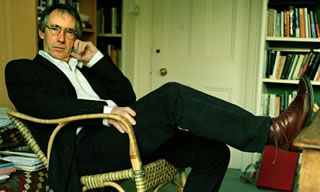
Ian McEwan (Aldershot, 21 juni 1948)
De Israëlische schrijver Alon Hilu werd geboren op 21 juni 1972 in Jaffa. Zie ook mijn blog van 21 uni 2009.
Uit: Death of a Monk
“I had no love for Father and Father had no love for me and the two of us had no love for one another, or any other way there is of restating and reshaping the sentence of our non-love.
He had, Father, a pair of large, pendulous testicles, a holy staff that gave off a pleasant fragrance, and when the maids bathed him in our home these would be exposed together as a couple, dripping thousands of drops of many waters.
He had swarthy, expressive feet which he would cross one over the other on the small stool next to the courtyard of our spacious home, and occasionally he would rout about between the toes and sniff with pleasure the bit of scum that clung to them.
I almost never saw Father during the day; it was his custom to rise early, pass quickly through the avenue of fruit orchards on the grounds of our home, which invariably caused him to grumble about the delay involved in walking its length, and attend to his thriving business concerns: lending with interest to peasants, releasing from customs goods that arrived from the far-off countries of Europe and taking care of his interests as far as his eye, which was never satisfied, would counsel and lead him.
Only at eventide, when the maids opened before him the carved wooden doors, would he return home, his presence filling the rooms at once like the blast of a ram’s horn at the conclusion of a fast day. Straight away the members of the household would encircle him, excitedly dancing attendance on him, Allah yatik ela’afia, May God grant you health, and they hastened to recount for him the day’s news, starting with all manner of tales and accounts to vilify me.”
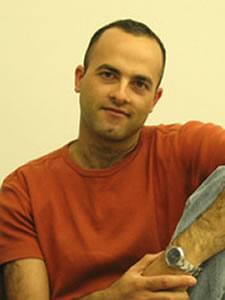
Alon Hilu (Jaffa, 21 juni 1972)
De Franse schrijfster Françoise Sagan (pseudoniem van Françoise Quoirez) werd geboren in Cajarc, Lot op 21 juni 1935. Zie ook mijn blog van 21 juni 2007 en ook mijn blog van 21 juni 2008 en ook mijn blog van 21 uni 2009.
Uit: Egoïste
“Un après-midi à Amsterdam, nous sommes allés le voir répéter. C’était un studio vert et marron, triste et sale, avec des glaces tachetées et un parquet criard, un studio comme tous les studios du monde. Il avait des lainages défraîchis et troués autour de son collant, et un pick-up grinçait et balbutiait une musique de Bach. Il s’était arrêté en nous voyant, le temps de lancer une plaisanterie et de s’éponger. Je le vis avec cette serviette éponge essuyer sa nuque, tamponner son torse, son visage avec des gestes un peu bourrus et curieusement détachés – comme on voit des palefreniers panser leurs chevaux.
Puis il fit remettre le disque au départ et ayant ôté ses mitaines et ses lainages, il se rendit au centre de la salle, toujours souriant. La musique partit et il cessa de sourire, prit la pose, les bras écartés, et il se regarda dans la glace.
Je n’avais jamais vu quelqu’un se regarder de la sorte. Les gens se regardent dans une glace avec effroi, complaisance ou gêne, et timidité généralement, mais ils ne se regardent jamais comme un étranger. Noureev regardait son corps, sa tête, les mouvements de son cou avec une objectivité, une froideur bienveillante tout à fait nouvelle pour moi. Il s’élançait, il lançait son corps, décrivait une arabesque parfaite, il se retrouvait les bras tendus dans une pose superbe ; il avait accompagné ce mouvement avec une justesse et une précision féline, il avait dans la glace le reflet même de la virilité et de la grâce confondue en un seul corps, et il gardait ce regard froid, intéressé, mais froid.”
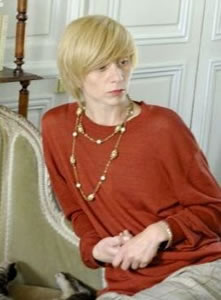
Françoise Sagan (21 juni 1935 – 24 september 2004)
De Belgische, Franstalige schrijver Patrick Lowie werd geboren op 21 juni 1964 in Brussel. Zie ook mijn blog van 21 uni 2009.
Uit: Le Plongeoir / O Trampolim
“Je n’ai pas pu résister à ton regard hagard. Pardonne-moi. Moi qui pensais pouvoir supporter toutes les cruautés. Celles de l’amour. J’ai abandonné. Perdu peut-être. L’envie d’oublier. Je pars. Ce bateau part. Loin des reflets de nos ombres. Ses prétextes sont plus percutants que les miens. Nos peurs s’enlacent plus facilement que nos corps. Mon doigt presque pointu et pointé sur ton sein gauche descend lentement vers cette île inconnue. Les glaçons fondent sous ton regard hagard. Vas-tu réussir à nous faire oublier mon corps ? Mon cœur va-t-il réussir à lier nos espoirs ?”
(…)
“Dans mon rêve, le plongeoir est le passage entre la vie et la mort ou le contraire. Le passage entre un continent et un autre. J’étais du côté de la pauvreté et de l’idiotie et de la terreur suivant certains. Je voulais bien sûr visiter simplement l’autre côté, celui de la richesse et de l’intelligence et de la tranquillité. Dans mon rêve, le plongeoir interminable est le doute qui nous empêche de vivre et qui n’est autre probablement que le temps qu’on se décide enfin à vivre.”
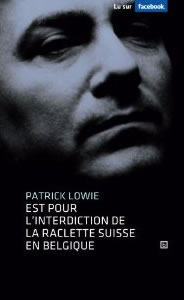
Patrick Lowie (Brussel, 21 juni 1964)
De Duitse dichter, schrijver en uitgever Wulf Kirsten werd geboren op 21 juni 1934 in Klipphausen bij Meißen. Zie ook mijn blog van 21 juni 2007 en ook mijn blog van 21 juni 2008 en ook mijn blog van 21 uni 2009.
Seestück
ein sommer, wie er nie wieder war. –
wahr ist nichts als der nachtatem des sees,
als die sprache der dinge, schwarzumrissen;
stille bis in die schlafplätze der vögel
im röhricht hinein.
einen atemzug verruhte der sommer.
in den baumkronen tonlose schritte,
der sommerweg führte über wolkenwälle,
hautschrift in der nacht hut.
der see ein blinder spiegel,
in den kühlen atem des wassers
tauchte ein wortpaar:
vorgeschmack von handschlag und ortswechsel.
zwei atemzüge, flüchtiges gleichmaß,
vom munde abgeweht.
beständiger ist nichts
als die himmelsrichtungen,
die uns fortziehn mit ihren langen armen.
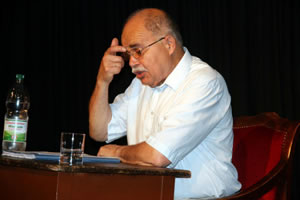
Wulf Kirsten (Klipphausen, 21 juni 1934)
Zie voor nog meer schrijvers van de 21 juni ook mijn vorige blog van vandaag en eveneens mijn eerste blog en ook mijn tweede blog van vandaag.
